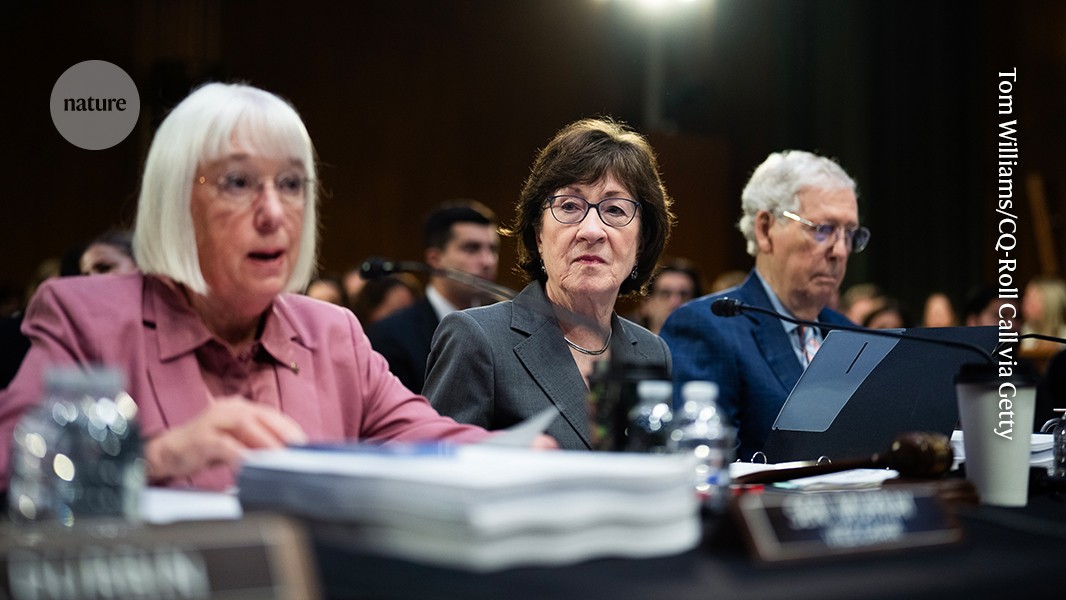‘Congress has your back’: US senators tell scientists they want to protect NIH budget

Senate budget bill includes small increase for the health-research agency — but faces a long road before being signed into law

Attendees at a meeting of a US Senate appropriations committee on 31 July: from left, Patty Murray, a Democrat from Washington state; Susan Collins, a Republican from Maine; and Mitch McConnell, a Republican from Kentucky.Credit: Tom Williams/CQ-Roll Call via Getty
A US Senate committee has voted to reject Republican President Donald Trump’s plan to cut the 2026 budget of the US National Institutes of Health (NIH) by 40% and to collapse its 27 institutes and centres into 8. Instead, Republicans and Democrats on the committee endorsed maintaining the biomedical agency’s structure and increasing its funding by US$400 million, or about 1%.
The details, presented in a bill released today by the committee, will probably change before the bill is signed into law. But the initial figure for the NIH, discussed at a meeting yesterday, offers yet another hint that the US Congress, which controls government spending, does not support Trump’s desire to slash US science. (Earlier this month, another Senate committee said it wanted to keep the budget for the US National Science Foundation relatively flat despite Trump’s call for a 57% reduction.)
“Given the alternative, the Senate’s recommendation of a $400-million increase for NIH is an indication the agency still has support on Capitol Hill,” says Jennifer Zeitzer, director of public affairs at the Federation of American Societies for Experimental Biology in Rockville, Maryland. “A 40% cut would have been devastating, so this is a good outcome in a tough year.”
The road ahead
The bill now faces several challenges. First, the full Senate must pass it. Then, the lower chamber of Congress, the US House of Representatives, will pass its own version, and the two bodies must come together to agree on a single bill that Trump is willing to sign.
The bill might also change if legislators introduce amendments before it’s sent to Trump’s desk. For example, Dick Durbin, a Democratic senator for Illinois, tried at the meeting yesterday to add a provision to reinstate billions of dollars in health-research funding that had been frozen or terminated by the Trump administration because projects — including some on COVID-19 — did not align with agency priorities.
The amendment failed in a vote that fell along party lines, with 14 Democrats voting for it and 15 Republicans voting against it. Shelley Moore Capito, a Republican senator for West Virginia, urged her colleagues to vote against the amendment, saying that “every president has the prerogative to implement new goals and priorities”.
Nevertheless, senators at the hearing rejoiced that they could come to a bipartisan agreement to fund health agencies: “To the scientists wondering if there will even be an NIH by the end of this administration, this committee’s resounding message is: ‘Yes, Congress has your back’,” said Patty Murray, a Democratic senator for Washington state and vice-chair of the committee. “We need you to stay here and keep this research going.”
Under the bill, budgets for other health agencies would also remain roughly the same. For example, the Centers for Disease Control and Prevention, whose budget the Trump administration wanted to cut by more than half, would receive $9.1 billion, compared with $9.2 billion in 2024.
Turbulent times
The committee meeting comes towards the end of a tumultuous week for the NIH, after the White House blocked, and then unblocked, the agency from spending the remainder of its 2025 budget — about $15 billion — by issuing grants. With the NIH cancelling grant-review meetings in early 2025, funding processes have been delayed, and agency staff members are working in overdrive to process as many grants as possible before the end of the fiscal year on 30 September. If they don’t distribute the money, the agency will have to return the unused funds to the US Treasury.
These disruptions have drawn condemnation, and not only from Trump’s opponents: 14 Republican senators sent a letter to the White House on 25 July demanding that the NIH be allowed to spend its full 2025 budget.
Enjoying our latest content?
Login or create an account to continue
- Access the most recent journalism from Nature's award-winning team
- Explore the latest features & opinion covering groundbreaking research
or
Sign in or create an accountdoi: https://doi.org/10.1038/d41586-025-02448-3
This story originally appeared on: Nature - Author:Max Kozlov


















